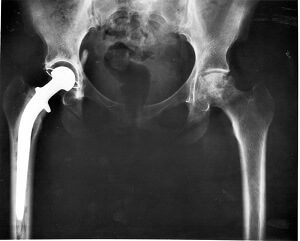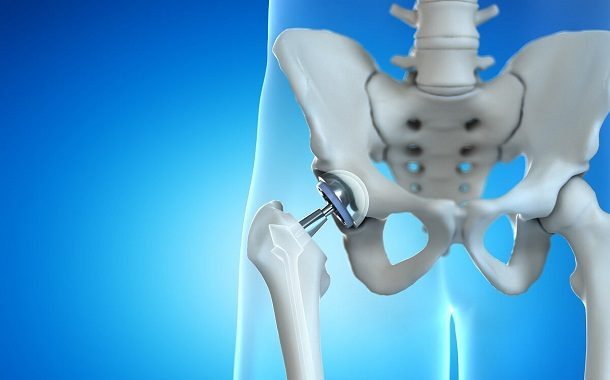Hip Replacement Cost
Last Updated on December 31, 2023
Written by CPA Alec Pow | Content Reviewed by ![]() CFA Alexander Popinker
CFA Alexander Popinker
If the articular cartilage in the joint is severely damaged due to osteoarthritis (hip osteoarthritis) or other causes, common movements such as walking or lifting and sitting on a chair can be painful and difficult for you. The hip can be stiff and wearing shoes or putting on socks becomes a challenge. As the disease progresses, you will feel pain even while resting.
If proper medication, changing daily activities, and using support (crutches/walking stick/walking frame) do not help relieve symptoms, it is time to consider hip replacement surgery. This intervention is safe and effective, ensures the disappearance of pain, increases the mobility of the hip, and helps you to resume daily, regular activities.
First performed in 1960, hip replacement is one of the most successful surgeries in medicine. Since then, innovations in surgical materials and techniques have significantly contributed to improving the performance of this intervention.
How Much Does Hip Replacement Cost?
According to Blue Cross Blue Shield of North Carolina, if you don’t have health insurance, you should be prepared to pay anywhere between $32,000 and $45,000 for the hip replacement surgery. However, the average cost is around $40,000.
Even if you don’t have health insurance, you can get a discount from some clinics. For example, the Kapiolani Medical Center from Hawaii, which charges around $33,500 for hip replacement surgery, offers discounts to the insured patients’ that may bring the total cost down to about $21,000 to $24,000.
The hip replacement surgery will not be covered by health insurance policies only if it is covered in a specific exclusion or when it is done using an experimental method, according to Blue Cross Blue Shield of Kansas. Also, the manufacturer of orthopedic devices, DePuy Orthopaedics Inc., says that usually the hip replacement surgeries are covered by health insurance.
You might also like our articles about the cost of inguinal hernia surgery, sciatica surgery, or Tommy John surgery.
If you have health insurance, expect to pay some thousands of dollars for this surgery. For instance, if you have Medicare insurance you would pay around $4,000 for the hip replacement surgery at the Dartmouth-Hitchcock Medical Center, including the coinsurance and deductibles. Also, at the same medical center, a patient whose health insurance policy includes a maximum out-of-pocket payment of $3,000 and a 20% copay for surgeries, will pay the maximum amount of $3,000 for the hip replacement surgery.
Hip replacement details
 Before the hip replacement surgery, the doctor will ask you to perform some tests and possibly specialized consultations for an accurate assessment of your health. You will also perform a pelvic x-ray which is necessary to assess the stage of osteoarthritis and which will be used to plan the surgery, this planning being essential for the success of the hip replacement treatment.
Before the hip replacement surgery, the doctor will ask you to perform some tests and possibly specialized consultations for an accurate assessment of your health. You will also perform a pelvic x-ray which is necessary to assess the stage of osteoarthritis and which will be used to plan the surgery, this planning being essential for the success of the hip replacement treatment.
After hospitalization, you will be consulted by your anesthetist. The most common types of anesthesia for this particular surgery are general anesthesia (you will be asleep), spinal anesthesia (you are awake, but you will not feel anything from the waist down), or regional anesthesia only for the limb to be operated on. With your help, the anesthesiologist will determine which type of anesthesia is best for you.
The surgery itself takes between an hour and two hours. The orthopedic surgeon will remove the damaged cartilage and bone and then position the new implants in a position to realign and work with your hip.
After surgery, you will be moved to a special room (postoperatively) where you will stay for a few hours until the effect of anesthesia passes. After waking up or the next day, you will be moved to the salon.
The average hospitalization period is 7 days. Patients will also receive appropriate anticoagulant therapy, consisting of subcutaneous injections into the abdominal fold up to 35 days postoperatively, as well as analgesic and anti-inflammatory treatment. The recovery exercises will continue in a specialized service. The checkup visit will be done at 3 weeks postoperatively, when the sutures will be removed, then at 6 weeks, 3 months, 6 months, and then annually.
What are the extra costs?
The best way to make your home safe is by equipping it with items that will help speed up the healing process, such as secure handrails on stairs, shower or bath handrails, a reacher for grabbing things from high places like cabinets and shelves, and cushions so you can sit with the knees in a lower position than the hips.
Important things to consider
Given the complexity of the surgery, we can expect a significant loss of blood during the operation, as well as postoperative bleeding discharged on the drainage tube.
As with any major surgery involving general anesthesia, there is also a low risk of stroke, heart attack, pneumonia, and blood clots.
Preparation for surgery is as important as postoperative recovery because it ensures the success of the intervention and the complete recovery of mobility and joint stability. It starts 2-3 months beforehand and is done through physiotherapy which aims to increase the muscle tone and mass, increase the joint amplitude, increase the stability and mobility of the hip, stimulate circulation and lymphatic drainage, prepare the opposite leg for the period of overload.
After the surgery, you have to walk daily. Initially in small steps over short distances (10-15 minutes) several times a day, then gradually increase the walking time and distance.


Leave a Reply
Want to join the discussion?Feel free to contribute!